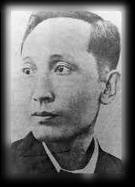A light that continues to illuminate
NEW YORK, New York — He was born poor and he died poor, not having materially profited from his service to a revolutionary government and his country that he envisioned as a just, humane and independent nation. He refused to pledge allegiance to a Western power that crossed the Pacific bent on an imperialist takeover, claiming that this was for the benefit of a captive brown race at the same time that that power betrayed its own revolutionary origins.
I refer to Apolinario Mabini, whose 150th birth anniversary is this month. A man usually described as the “brains of the revolution” and the “Sublime Paralytic,” he was by no means an ilustrado. Mabini had his roots deep in the soil of the Southern Tagalog province of Batangas, having been born to a family of subsistence farmers from the barrio of Talaga in the township of Tanauan.
By dint of hard work—his lack of funds at times meant he dropped out periodically to earn money for his tuition—and his brilliant intellect, he earned his Bachelor of Arts with the highest honors, or summa cum laude, from San Juan de Letran, and later on obtained a law degree from the University of Santo Tomas, and a license to practice law.
In the largely ilustrado pantheon of 1896, he and Andres Bonifacio, an urban prole from Tondo, stick out like sore thumbs. The two would have known each other, as both had joined Rizal’s La Liga Filipina. With Rizal’s exile to Mindanao, Mabini favored La Liga Filipina staying on the reformist path while Bonifacio advocated taking up arms against Spain. Bonifacio was dead by the time Mabini became Emilio Aguinaldo’s chief adviser just before the declaration of independence in June of 1898, convinced now that force of arms was necessary to gain independence. Aguinaldo, hearing of Mabini’s brilliant legal mind, recruited him to navigate the tricky course towards independence. One of the first things Mabini did was to convince Aguinaldo to change the designation of his administration, from dictatorial to that of revolutionary, to emphasize both the turmoil of the times and the transition to a representative government.
And how did the Batangueño get to Kawit, given his semi-paralysis? He was carted there, in a hammock, by relays of men.
When the Aguinaldo government relocated to Malolos where the first Congress was convened, Mabini rubbed shoulders and matched wits with its well-born members, to many of whom if not most, he was clearly superior in intellect, vision and integrity. The men of property viewed Mabini with upper-class disdain and not a little bit of envy, for his position close to the chief executive. Nick Joaquin, in his provocative A Question of Heroes—a book at once entertaining, original and enlightening—in fact considers Mabini “a power behind the throne.” In the chapter entitled “Mabini the Mystery,” Joaquin points out that unlike ilustrados such as Rizal and the Luna brothers who had lived in Europe, “all [Mabini’s] training was done right here in his own country. The evidence of Mabini’s generation was that it could handle the affairs of government with only the education it had acquired locally. It no longer needed Europe.”
To honor him, the Philippine Consulate General of New York recently arranged a tertulia at the Center on Fifth Avenue, a kind of town hall gathering with several speakers, including Consul General Mario de Leon, Jr., the actress and singer Lorli Villanueva, Ms. Ilo Wallenstein (a native also of Mabini’s province), Mrs. Fe Cabactulan, Arianne Recto and myself, to lay the groundwork for a discussion of Mabini’s life and his relevance to contemporary times. Musical interludes were provided by Ms. Kay Habana and Mr. Geuel Maranan Peñalosa.
The Consul General expounded on Mabini’s historic role as the first Secretary of Foreign Affairs; Villanueva, on how Mabini’s disability didn’t deter him from his fulfilling his duties to the nation-in-progress; Cabactulan and Recto read his True Decalogue in Tagalog and English, respectively; and Ms. Wallenstein provided humorous commentaries in Tagalog on Mabini’s life in an inimitable Batangas accent.
Out of the myriad complexities that marked this man, many of which Joaquin details in his book, what struck me was his devotion to the cause no longer of the revolution but of the war against the United States, always from the point of view of what was not only legal but moral as well—Mabini was the complete opposite of the shyster lawyer—hence the Dekalogo, written both as a kind of political manifesto and a prescription of right behavior.
His devotion meant being arrested by the gringos for continuing to advocate independence. He was released but exiled a few months later, in January of 1901, to the Marianas, as he refused to pledge allegiance to an unlawful, unrepresentative government. In February of 1903, he finally acquiesced to the pledge as he wished to return to Manila, knowing he was at death’s door and wanting to die in his homeland. He passed away on May 13, 1903, shortly after his return, from complications due to cholera.
I remember passing by the great man’s simple nipa home by the old Nagtahan Bridge spanning the Pasig River, and not far from Malacañang Palace. The bridge was a rickety wooden affair, and motor vehicles were not allowed to traverse it, and so one took a jeepney to either side, and alit once at the bridge and crossed on foot, either to Santa Mesa or to Pandacan. The residence seemed forlorn, unlit, and in disrepair, a far cry from the spacious upper class Calamba home of Rizal (today painted a hideous green) or the mansion-like residence of Emilio Aguinaldo in Kawit, Cavite. But its modest frame sheltered a brilliance that continues to burn brightly today.
Copyright L.H.Francia 2014
RELATED STORIES
